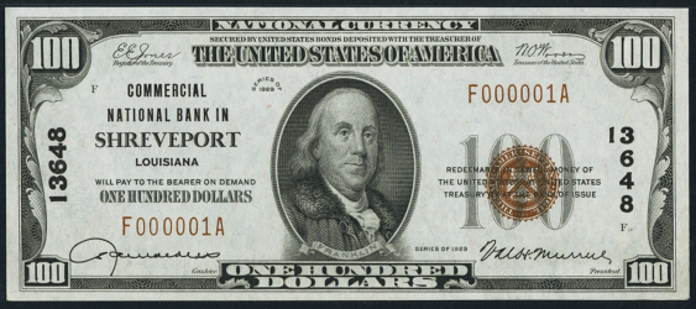One Hundred Dollar Notes › Nationals › 1929 One Hundred Dollar National Bank Notes › Iowa Charters › 1929 $100 Council B Iowa First National Bank
Get Value Now
| Item | Info |
|---|---|
| Series | 1929 |
| Charter | #1479 First National Bank of Council B, Iowa |
| Year Chartered | 1865, 944 Banks Chartered |
| City Info | Council Bluffs is a city in and the county seat of Pottawattamie County, Iowa, United States. The city is the most populous Omaha suburb and a principal city in the Omaha-Council Bluffs metropolitan area. It is located on the east bank of the Missouri River, across from Omaha, Nebraska. Council Bluffs was known until 1852 as Kanesville — the historic starting point of the Mormon Trail, Kanesville also became the northernmost anchor town of the other emigrant trails. Source: Wikipedia |
| Similar Cities | If your note doesn't match try: 1. Council Bluffs, Iowa - Pacific National Bank 2. Council Bluffs, Iowa - Council Bluffs National Bank 3. Council Bluffs, Iowa - Commercial National Bank 4. Council Bluffs, Iowa - City National Bank 5. Council Bluffs, Iowa - First National Bank |
| Seal Varieties | Small Brown |
| See Also | If your note doesn't match try: 1. 1929 $100 Federal Reserve Bank Note 2. 1928 $100 Federal Reserve Note 3. 1928A $100 Federal Reserve Note 4. 1934 $100 Federal Reserve Note 5. 1934A $100 Federal Reserve Note 6. 1934B $100 Federal Reserve Note |
| Other Info | 1. Value depends on notes known for charter, condition and market demand. |
| Neat Fact | Check your note's serial number. Serial #1 notes are valuable, even on common charters. Serial numbers 2-4 are also desirable in some cases. |
No Obligations Offers and Appraisals
Please submit a good photo or scan. It will be identified and evaluated. Understand there may be subtle differences between the image you see above and your note. Signatures, design, markings and note condition will determine the offer price. Notes in Uncirculated or better condition receive the best offers.
Appraisals can be estimated for wholesale and retail prices. Wholesale is what dealers typically pay. Retail is what a collector might pay. Retail is slightly higher in most cases.
Please visit this page for USA Paper Money Reference. Do not treat this page as a reference guide, it is for appraisal and acquisition purposes only.
